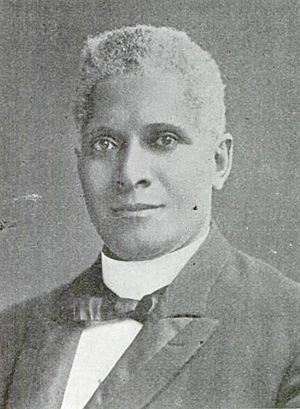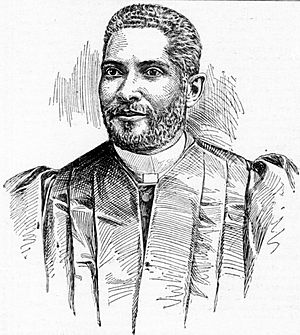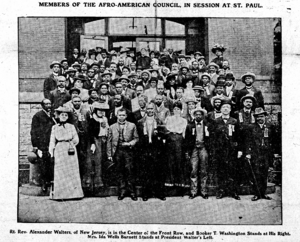Alexander Walters facts for kids
Quick facts for kids
Alexander Walters
|
|
|---|---|
 |
|
| Born | August 1, 1858 Bardstown, Kentucky, U.S.
|
| Died | February 2, 1917 (aged 58) New York, New York, U.S.
|
| Occupation | minister |
| Political party | Democratic |
| Religion | AME Zion |
Bishop Alexander Walters (born August 1, 1858 – died February 2, 1917) was an important American church leader and a well-known civil rights activist. He was born into slavery in Bardstown, Kentucky, just before the Civil War.
He became a bishop in the African Methodist Episcopal Zion Church when he was 33 years old. Later, at age 40, he became the president of the National Afro-American Council. This was the biggest civil rights group in the country at that time. He led the council for almost ten years.
Contents
About Alexander Walters
Alexander Walters was born on August 1, 1858, in Bardstown, Kentucky. He was the oldest son of Henry and Harriet Walters. He went to a private school where different teachers taught him.
In 1871, he moved to Louisville. There, he worked as a waiter in homes, hotels, and on steamboats. He was the top student in his high school class in 1875.
Just two years later, he was allowed to preach by his church. He served as a pastor in several cities, including Indianapolis, Louisville, San Francisco, and Portland, Oregon. In 1888, he was assigned to the Mother Zion Church in New York City.
In 1889, Walters was chosen to represent his church in London at a big Sunday School meeting. He also traveled to other parts of Europe, Egypt, and the Holy Land. In May 1892, he was elected as a bishop for the A.M.E. Zion Church in Pittsburgh.
While in New York, he met a journalist named Timothy Thomas Fortune. Fortune was starting a group called the National Afro-American League. This group aimed to protect African Americans from violence and unfair treatment. Walters quickly supported the League, but it stopped working by 1893.
Leading the National Afro-American Council
In March 1898, Walters was worried about the increase in violent attacks against African Americans. He asked Timothy Thomas Fortune to ask Black leaders across the country to meet. More than 150 leaders agreed to the meeting.
This meeting happened in Rochester, New York, in September 1898. Famous people like Susan B. Anthony and the wife of Frederick Douglass also attended.
The new group was called the National Afro-American Council. It was meant to be like the old League. The Council's rules said it would not favor any political party. It planned to have local groups and meet every year. Its goal was to speak out against unfair treatment and ask for laws to protect Black people.
Walters was chosen as the first president, and Fortune became the first head of the executive committee.
The Council held meetings in large cities across the country, starting in Washington, D.C., in December 1898. Many African American journalists, church leaders, lawyers, teachers, and community activists attended. Important Black men and women were part of its leadership.
The Council met in Chicago (1899), Indianapolis (1900), and Philadelphia (1901). Each time, Walters was re-elected as president. The group made strong statements against unfair treatment.
At the meeting in Saint Paul, Minnesota, in 1902, Walters stepped down as president. He became the head of the executive committee instead. Fortune then became president. Fortune was a supporter of Booker T. Washington. He started to guide the Council in a different direction than Walters preferred. Soon, the Council became less active.
Walters waited for his chance. He became president again in Detroit in 1905. He asked old members to come back to the group. He was re-elected in New York (1906) and Baltimore (1907). However, the Council slowly lost its unity.
Walters became so well-known that he met with President Woodrow Wilson at the White House on January 10, 1916. They talked about how to get African Americans approved for government jobs by Wilson. Walters wrote to Wilson after the meeting, suggesting he talk to senators who were against approving Black nominees.
Later Life and Activism
In 1908, W. E. B. Du Bois offered to combine the Council with other groups, but Walters said no. Walters upset some of his Black followers when he supported the Democratic presidential candidate, William Jennings Bryan, in 1908.
The Council soon broke apart. But Walters quickly found a new group to lead. He became president of the new National Independent Political League. In the 1910s, he joined both the new National Association for the Advancement of Colored People (NAACP) and the National Urban League.
Walters traveled a lot to other countries. He often went to London. In 1900, he attended the First Pan-African Conference there. He gave a speech about the challenges faced by Black people in America. He also became president of the Pan-African Association.
He visited West Africa in 1910 and the Caribbean in 1911. He was respected around the world. In 1915, US President Woodrow Wilson offered him a job as the US minister to Liberia, but Walters turned it down.
Walters passed away on February 2, 1917, in New York City. His funeral was held at Zion Church. Many people spoke about his life and achievements.
Family Life
Alexander Walters was married three times and had six children. His first wife, Katie Knox Walters, died in 1896. His second wife, Emeline Virginia Byrd Walters, died in 1902. He was survived by his third wife, Lelia Coleman Walters.
Around the time of his death, his wife worked as a clerk for the United States Bureau of Immigration at Ellis Island. The couple's son, Hillis Walters (1904–1984), was an actor during the Harlem Renaissance in the 1920s and 1930s. Later, he became a composer. One of his most famous songs was "Pass Me By" (1946). This song was recorded by famous singers like Lena Horne and Peggy Lee.
Bishop Walters is buried in Brooklyn, New York, in Mother Zion's Cypress Hills Cemetery.
 | William Lucy |
 | Charles Hayes |
 | Cleveland Robinson |



